| Wim WENDERS | Wilhelm Ernst Wenders |
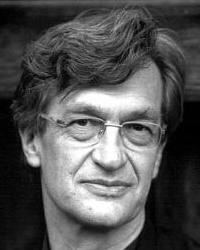 * 14.08.1945, Düsseldorf, Deutschland * 14.08.1945, Düsseldorf, DeutschlandRegisseur * nach dem Abitur studiert vier Semester Medizin und Philosophie in München, Freiburg und Düsseldorf * 1966/67 inszeniert seinen ersten eigenen Kurzfilm (Schauplätze) * 1966/67 einjähriger Aufenthalt in Paris - dort bewirbt sich vergeblich an der Filmhochschule IDHEC * 1967 nimmt ein Studium an der Hochschule für Fernsehen und Film in München auf * während des Filmstudiums realisiert mehrere Kurzfilme und ist als Autor über Film und Rockmusik für Zeitschriften und "Süddeutsche Zeitung" tätig * 1969/70 dreht seinen Abschlussfilm Summer in the City * 1971 gründet mit zwölf weiteren Filmemachern den genossenschaftlichen Filmverlag der Autoren (Förderung von Produktion und Vertrieb neuer deutscher Filme) * 1974 feiert den künstlerischen Durchbruch mit dem hoch gelobten Roadmovie Alice in den Städten * seit 1974 betreibt die Produktionsfirma Wim Wenders-Produktion * 1976 gründet Road Movies Filmproduktion * seit Anfang der 80er Jahre inszeniert internationale (Co-)Produktionen (Paris, Texas, 1983; Der Himmel über Berlin, 1986/87; Until the End of the World, 1990; Don't Come Knocking, 2004) und findet zwischen den Spielfilmen immer wieder Zeit für persönliche filmische Essays und Musikdokumentationen (Lightning over Water, 1979/80; Buena Vista Social Club, 1998/99) * seit 1991 Vorsitzender der European Film Academy * seit 2003 unterichtet an der Hochschule für bildende Künste in Hamburg * Juryvorsitzender der Filmfestspiele von Cannes (1989) und von Venedig (2008) * 2023 erhält den renommierten französischen Filmpreis Prix Lumière * 2024 wird mit dem Großen Deutsch-Französischen Medienpreis geehrt * verheiratet mit Ronee Blakley (1979-81) Siebenjährig beginnt Wim Wenders zu fotografieren, mit 22 Jahren dreht er als Absolvent des ersten Jahrgangs der Hochschule für Film und Fernsehen München seinen ersten Spielfilm. 1971 gründet er mit zwölf weiteren Filmemachern den genossenschaftlichen Filmverlag der Autoren, der Produktion und Vertrieb neuer deutscher Filme fördern soll. Mit Filmen wie "Die Angst des Tormanns beim Elfmeter" (1971) und "Alice in den Städten" (1974) wird Wenders zu einem führenden Vertreter des "Neuen Deutschen Films". 1977 dreht er einen seiner erfolgreichsten Filme "Der amerikanische Freund" und wird daraufhin von Regisseur Francis Ford Coppola in die USA eingeladen. Dort entsteht u.a. "Hammett", doch 1982 kehrt Wenders nach Deutschland zurück. Zu seinen großen Erfolgen in den 1980er-Jahren zählen "Der Stand der Dinge" (1982), "Paris, Texas" (1984) und "Der Himmel über Berlin" (1987). Ab Mitte der 1990er-Jahre dreht er seine Filme meist in den USA und in englischer Sprache, wie "Am Ende der Gewalt" (1997), "Buena Vista Social Club" (1999) und "The Million Dollar Hotel" (2000). Wenders, der auch als Fotograf mit Büchern und Ausstellungen international erfolgreich ist, wird 1989 Ehrendoktor der Theologie der Sorbonne in Paris, Mitglied der Akademie der Künste in Berlin, Vorsitzender der European Film Academy und seit 1993 Professor an der HFFM. 1990 erhält er das Bundesverdienstkreuz, 1991 den Murnau-Preis. Im Rahmen seiner Professur an der Hochschule für Bildende Künste Hamburg realisiert Wenders 2004/2005 mit seinen Studenten ein Projekt über Träume im Film. Zu seiner langen Liste an Filmpreisen gehören die Goldene Palme in Cannes, der Silberne Bär der Berlinale sowie eine Oscarnominierung. [MDR, August 2010] Wim Wenders schaffte seinen künstlerischen Durchbruch als Regisseur mit "Alice in den Städten" (1973). Drei Jahre später gründete er seine eigene Produktionsfirma, die "Road Movies Filmproduktion". Auch in den USA wurde Wim Wenders bekannt, zuerst durch "Der amerikanische Freund" (1977), eine Adaption des Romans von Patricia Highsmith, schließlich mit "Hammett" (1982), einem Film über den amerikanischen Schriftsteller. 1984 erhielt sein Film "Paris, Texas" die Goldene Palme bei den Filmfestspielen in Cannes. 1987 folgte der, neben "Paris, Texas", kommerziell erfolgreichste Film Wim Wenders': "Der Himmel über Berlin". Zu seinen neueren Filmen zählen "The Million Dollar Hotel" (2000), seine Musiker-Dokumentationen wie "Buena Vista Social Club" (1999) und "Viel passiert - Der BAP-Film" (2002) und "Palermo Shooting" (2008). Wim Wenders neuester Film, der 3D-Tanzfilm "Pina - tanzt, tanzt, sonst sind wir verloren" (2010) ist eine Hommage an die Wuppertaler Choreographin Pina Bausch, indem er "der Kunst Pina Bauschs ein eigenes "filmisches Bühnenbild" entgegenstellt, wenn er sinnlich, poetisch, im guten Sinn auch spektakulär innere Zustände nach außen bringt und einen eigenen emotionalen Film-Raum schafft, in dem sich die getanzte psychologische Handlung entfaltet." (Horst Peter Koll, "film-dienst", 2011). [ARTE, Juni 2011] |
| FILMS |
| # Summer in the City (1969/70-D; R+B: Wim Wenders, K: Robert/Robby Müller, M: various, D: Hanns Zischler: Hanns, Edda Köchl: Edda) 125m-Roadmovie (12-01; 70?; 16mm; 1.33) > Abschlussfilm: wegen der unautorisierten Übernahme von Musiktiteln kann der Film nicht verliehen werden und wird nur auf Filmfestivals gezeigt. # Die Angst des Tormanns beim Elfmeter (1971-D/A; R: Wim Wenders, B: Wim Wenders; Peter Handke, K: Robby Müller, M: Jürgen Knieper, D: Arthur Brauss: Joseph Bloch, Kai Fischer: Hertha Gabler) 101m-Sportdrama (Erzählung von Peter Handke, 1970) (08-09; 78??-Paris, F) > TVM (7202) # Der scharlachrote Buchstabe / La letra escarlata (1972-D/E; R: Wim Wenders, B: Wim Wenders, Bernardo Fernandez, K: Robby Müller, M: Jürgen Knieper, D: Senta Berger: Hester Prynne * Hans Christian Blech: Roger Chillingworth * Lou Castel: Rev Dimmesdale) 94m-Drama (Roman von Nathaniel Hawthorne) (08-10; 7810-E) (D: TVM) # Alice in den Städten (1973-D; R: Wim Wenders, B: Wim Wenders; Veith von Fürstenberg, K: Robby Müller, D: Rüdiger Vogler: Philip Winter, Yella Rottländer: Alice van Damm, Lisa Kreuzer: Lisa van Damm) 112m-Roadmovie (08-09; 7405) # Falsche Bewegung (1974-D; R: Wim Wenders, B: Peter Handke, K: Robby Müller, M: Jürgen Knieper, D: Rüdiger Vogler: Wilhelm Meister, Hans Christian Blech: Laertes, Hanna Schygulla: Therese Farner, Nastassja Nakszynski [=Nastassja Kinski]: Mignon, Peter Kern: Bernhard Landau, Ivan Desny: Industrieller, Marianne Hoppe: Frau Meister, Elisabeth/Lisa Kreuzer: Janine) 103m-Roadmovie (frei nach Roman von Johann Wolfgang von Goethe, 1795/96) (09-11; 7503) # Im Lauf der Zeit (1975-D; R+B: Wim Wenders, K: Robby Müller, M: Axel Linstädt, D: Rüdiger Vogler: Bruno Winter, Hanns Zischler: Robert Lander, Lisa Kreuzer: Pauline) 175m-Roadmovie (07-10; 7603) # Der amerikanische Freund (1976/77-D/F) (Roman von Patricia Highsmith) (7706) # Der Stand der Dinge / O estado das coisas (1981-D/P/USA; R: Wim Wenders, B: Wim Wenders, Robert Kramer, K: Henri Alekan, Martin Schäfer, Fred Murphy, M: Jürgen Knieper, D: Patrick Bauchau: Friedrich) 124m-Satiredrama (02-03; 8210) # Hammett (Hammett, 1980-81-USA * Frederic Forrest, Peter Boyle, Marilu Henner) (Buch von Joe Gores) (02-?, '80; 11-23 Tage, '81 > reshoot; 8206) # Paris, Texas (1983-D/F * Harry Dean Stanton, Nastassja Kinski, Dean Stockwell, Aurore Clement, Hunter Carson) (09-12; 8409) # Der Himmel über Berlin (1986/87-D/F * Bruno Ganz, Solveig Dommartin, Otto Sander, Curt Bois & Peter Falk) (8709) # Until the End of the World / Bis ans Ende der Welt / Jusqu'au bout du monde (1990-AUS/D/F; R: Wim Wenders, B: Peter Carey, Wim Wenders, K: Robby Müller, M: Graeme Revell, D: William Hurt: Sam Farber/Trevor McPhee * Solveig Dommartin: Claire Tourneur) 179/279m-Sci-Fi-Roadmovie (01?03-5 Monate; 9109) # In weiter Ferne, so nah! (1992-D) (9309) # Lisbon Story / Viagem a Lisboa (1994-D/P; d+B: Wim Wenders, K: Lisa Rinzler, D: Rüdiger Vogler: Phillip Winter * Patrick Bauchau: Friedrich Monroe) 103m-Drama (05-09; 9505) # Die Gebrüder Skladanowsky / Die Brüder Skladanowsky (1993-95-D) 46/76m-Biopicdrama/Doku (9905) > Mischung aus Dokumentarfilm und Fiktion über die Filmpioniere Max, Emil und Eugen Skladanowsky. Neben dem Programm, das damals zu sehen war - Varieté-Szenen, mit der von den Skladanowskys entwickelten Handkurbelkamera aufgenommen - und 1994 rekonstruiert wurde, erzählen Wim Wenders und Studenten der Münchner Hochschule für Fernsehen und Film in drei Kurzfilmen zunächst Anekdoten darüber, wie es im Atelier der Pioniere hätte zugehen können und wie sie in Konkurrenz zu den Brüdern Lumière unterliegen, bevor die 91jährige Tochter von Max Skladanowsky interviewt wird und die historischen Gestalten das Berlin der Gegenwart "erobern". # Par-delà les nuages / Al di là delle nuvole / Jenseits der Wolken (1994-95-F/I/D; R: Michelangelo Antonioni, Wim Wenders, B: Michelangelo Antonioni, Wim Wenders, Tonino Guerra, K: Alfio Contini, Robby Müller, M: various, D: Fanny Ardant: Patrizia * Chiara Caselli: Olga * Irene Jacob: junge Frau * John Malkovich: Regisseur * Sophie Marceau: junge Frau * Vincent Perez: Niccolo * Jean Reno: Carlo * Kim Rossi Stuart: Silvano * Ines Sastre: Carmen * Peter Weller: Roberto & Marcello Mastroianni: Maler & Jeanne Moreau: Frau) 113/9m-Episodenfilm (Buch von Michelangelo Antonioni) (11-12 & 02-03; 9510-I) # The End of Violence / Am Ende der Gewalt (1996-USA/D * Bill Pullman, Andie MacDowell, Gabriel Byrne) (9709) # The Million Dollar Hotel (1999-D/USA; d: Wim Wenders, B: Nicholas Klein, K: Phedon Papamichael, M: Jon Hassell, Bono, Daniel Lanois, Brian Eno, D: Jeremy Davies: Tom Tom, Milla Jovovich: Eloise, Mel Gibson: Skinner) 122m-Thrillerromanze (01?02-03; 0002) # Ten Minutes Older: The Trumpet (2001/02-D/GB; M: Paul Englishby > 5-Twelve Miles to Trona / Zwölf Meilen bis Trona * d+B: Wim Wenders, K: Phedon Papamichael, D: Charles Esten: Bill, Amber Tamblyn: Kate) 91m-Episodenfilm (0212) # Land of Plenty (2003-USA/D; d: Wim Wenders, B: Michael Meredith & Wim Wenders, K: Franz Lustig, MS: Linda Cohen, D: Michelle Williams: Lana ° John Diehl: Paul) 123m-Drama (09-10; 0410) # Don't Come Knocking (2004-D/F * Sam Shepard, Jessica Lange, Tim Roth, Gabriel Mann, Sarah Polley, Fairuza Balk & Eva Marie Saint) (0508) # Palermo Shooting (2007-D/I/F) (0811) # Every Thing Will Be Fine (2013-14-D/CDN/F/S/N; R: Wim Wenders, B: Bjørn Olaf Johannessen, K: Benoît Debie, M: Alexandre Desplat, D: James Franco: Tomas Eldan, Charlotte Gainsbourg: Kate, Marie-Josée Croze: Ann, Robert Naylor: Christopher, Patrick Bauchau: Vater von Tomas, Peter Stormare: Verleger & Rachel McAdams: Sara) 118m-Drama (08>01; 1504) # Les beaux jours d'Aranjuez / Die schönen Tage von Aranjuez (2015-F/D; R+B: Wim Wenders, K: Benoît Debie, D: Reda Kateb: Mann ° Sophie Semin: Frau, Jens Harzer: Schriftsteller, Nick Cave: Nick Cave & Peter Handke: Gärtner) 98m-Drama (Bühnenstück von Peter Handke, 2012) (06 > 10 Tage; 1611) # Submergence / Grenzenlos / Inmersión (2016-D/F/E; R: Wim Wenders, B: Erin Dignam, K: Benoît Debie, M: Fernando Velázquez, D: James McAvoy: James Moore ° Alicia Vikander: Danielle Flinders, Alexander Siddig: Dr. Shadid, Celyn Jones: Thumbs, Reda Kateb: Saif) 112m-Thrillerdrama (Roman von by J.M. Ledgard, 2011) (04-08; 1804) # Perfect Days (2022-J/D; R: Wim Wenders, B: Wim Wenders, Takuma Takasaki, K: Franz Lustig, D: Kōji Yakusho: Hirayama, Tokio Emoto: Takashi, Arisa Nakano: Niko, Aoi Yamada: Aya, Yumi Asō: Keiko, Sayuri Ishikawa: Mama, Tomokazu Miura: Tomoyama & Min Tanaka: Obdachloser) 125m-Drama (10 > 16 Tage; 2312) |
| AWARDS |
| > Filmpreis in Gold (Regie) für Falsche Bewegung [Deutscher Filmpreis 1975] > Filmpreis in Gold (Regie) für Der amerikanische Freund [Deutscher Filmpreis 1978] > BAFTA Award (beste Regie) für Paris, Texas (1985) > Preis (beste Regie) für Der Himmel über Berlin [Filmfestspiele Cannes 1987] > Preis (beste Regie) für Der Himmel über Berlin [Europäischer Filmpreis 1988] > Regiepreis für Der Himmel über Berlin [Bayerischer Filmpreis 1988] > Regiepreis für In weiter Ferne, so nah! [Bayerischer Filmpreis 1994] > Filmpreis in Gold (Regie) für The End of Violence [Deutscher Filmpreis 1998] > Ehrenleopard [Filmfestspiele Locarno 2005] |
| BOOKS |
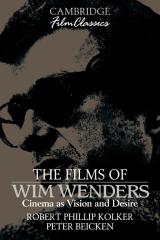 Robert Phillip Kolker, Peter Beicken: The Films of Wim Wenders: Cinema as Vision and Desire. [Cambridge]: Cambridge University Press, 1993 Robert Phillip Kolker, Peter Beicken: The Films of Wim Wenders: Cinema as Vision and Desire. [Cambridge]: Cambridge University Press, 1993The authors trace the development of one of the most well-known directors of the New German Cinema that flourished in the 1970s and early 1980s. Examining Wim Wenders' career from his early film school productions through his mature works of the 1970s, this book also analyses the most recent works, as well as the themes and preoccupations that unite his oeuvre. As the authors note, Wenders' works have been profoundly influenced by American films, especially the 'road movie' genre. His own work often features characters who are always on the move, in an attempt to capture a glimpse of their identity and place in the world. They also represent a generation of postwar Germans seeking to redeem themselves and the history of their country by turning to American popular culture, particularly its music and movies. > Contents: Preface; Part I. The Boy with the Movie Camera: Biography; Historical background; Student films; Part II. On the Road: Exile and Innocence: Major themes and images in Wenders' films; Part III. Close analysis of Selected Films: Kings of the Road; The State of Things; Paris, Texas: between the winds; Wings of Desire: between heaven and earth; Part IV. Conclusion: A stranger in Heimat; Footnotes to I–IV; Filmography; Bibliography. > 212 pages * 60 b/w illus., paperback |
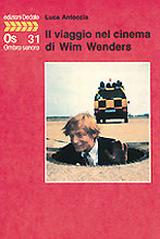 Luca Antoccia: Il viaggio nel cinema di Wim Wenders. Bari: Dedalo, 1994 Luca Antoccia: Il viaggio nel cinema di Wim Wenders. Bari: Dedalo, 1994Wim Wenders e la passione del cinema americano, la nouvelle vague, la grande tradizione tedesca, il gusto della forma e il piacere di raccontare storie, la sensibilità all'avventura, alla ricerca, l'attrazione per il mondo contemporaneo. La prima parte del libro si apre con un'analisi dello sviluppo di una moderna cultura del viaggio, dal romanticismo agli anni del rock. La seconda esamina, film per film, l'opera del regista, dai primi esperimenti tra pittura e cinema al recente "Fino alla fine del mondo". Attraverso il filo rosso del viaggio trovano così posto gli altri temi ad esso correlati: il rapporto storie-immagini, il paesaggio, la riflessione sulla comunicazione, i nuovi media, la pubblicità. > 224 p., 46 ill. b/n |
 Roger F. Cook, Gerd Gemünden [Hg.]: The Cinema of Wim Wenders: Image, Narrative, and the Postmodern Condition. Detroit: Wayne State University Press, 1997 Roger F. Cook, Gerd Gemünden [Hg.]: The Cinema of Wim Wenders: Image, Narrative, and the Postmodern Condition. Detroit: Wayne State University Press, 1997The Cinema of Wim Wenders, the first anthology of scholarly work on Wenders, is a unique anthropology of source materials and selected critical essays on the films of Wim Wenders, a major filmmaker in the so-called New German Cinema movement. His work, probably more than that of any other European director, reflects the tension between the European auteur tradition and the increasing dominance of the American media industry. In both his filmmaking and his critical writing, he explores how the relationship between image and narrative manifests the basic opposition between these two film traditions. This book serves as an introduction to the central concerns of his cinema while situation his work within German film history and the contemporary debates about postmodern film and media theory. > 284p. illus. filmog. bibliog. index., paperback |
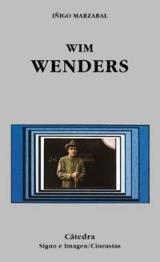 Iñigo Marzabal: Wim Wenders. Madrid: Catedra, 1998 Iñigo Marzabal: Wim Wenders. Madrid: Catedra, 1998Esta monografía analiza la carrera de uno de los directores más conocidos del cine alemán, desde sus primeras producciones, pasando por sus obras de madurez de los años 70, hasta los últimos filmes, así como los temas y preocupaciones recurrentes que en ellos aparecen. El objetivo último de este libro es determinar cuál es el estilo, la "identidad visual" de las películas que se atribuyen a Wenders. Para ello, el director despliega una serie de temas generales que atraviesan el cine de W.Wenders para, a continuación, analizar cómo trabaja la forma en lo concreto, en las películas tomadas como unidades auto-suficientes, pues cada texto, en su singularidad, constituye una excepción a cualquier intento de generalización. > Índice: I. Introducción.1. Una figura... sobre un fondo. 2. La unidad fracturada. 3. Salem, Madrid. 4. En busca de un lugar. 5. Viaje y creación. 6. ¿Muerte del cine? 7. Excepciones a la regla. 8. La muerte del padre. 9. La creación: entre la realidad y la ficción. 10. Los supervivientes. 11. De entre los muertos. 12. El amigo japonés. 13. Érase una vez. 14. Continuará. 15. Berlín revisitado. 16. "Dejà-vu". II. Filmografía. III. Bibliografía. * 376 páginas |
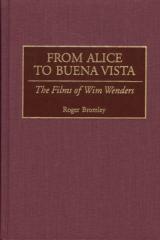 Roger Bromley: From Alice to Buena Vista: The Films of Wim Wenders. Westport/London: Praeger, 2001 Roger Bromley: From Alice to Buena Vista: The Films of Wim Wenders. Westport/London: Praeger, 2001This analysis of the films of Wim Wenders from the early 1970's through the 1990's attempts to place his work in the cultural and political context of the time. Feminist analysis, cultural theory, and psychoanalysis combine to explore the major themes in the films with an emphasis on gender and narrative and on Wenders' concern with the representation of otherness. Wenders' earlier films reflect concerns with identity and with issues of masculinity and detachment. His later films reveal a preoccupation with seeing, images, and love, which culminated in the international success of The Buena Vista Social Club. As this study suggests, Wenders' later works manifest a shift in direction away from indifference and toward reconciliation, ethical practice, and relationships. This study will appeal to film scholars, to those with a special interest in German cinema and culture and to admirers of Wenders' films. Thematically arranged, chapters begin with the early films and trace the masculinity, identity, and lost narrative motifs throughout Wenders' oeuvre. > xii, 120p.; filmog. bibliog. index |
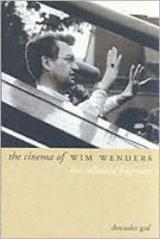 Alexander Graf: The Cinema of Wim Wenders: The Celluloid Highway. London: Wallflower Press, 2002 Alexander Graf: The Cinema of Wim Wenders: The Celluloid Highway. London: Wallflower Press, 2002The Cinema of Wim Wenders: The Celluloid Highway is a study of the films of this most prominent of German directors, and penetrates the seductive sounds and images for which he is best known. The book analyses the individual films in the context of a preoccupation central to all of Wenders’ work and writings: why modern cinema – a recording art, solely composed of sounds and images – naturally developed into a primarily narrative medium, a domain traditionally associated with words and sentences. With its emphasis on analysing the films themselves, this book identifies and critically elucidates Wenders’ chief artistic motivation: that the act of seeing can constitute a creative act in its own right. > ix, 179 p.; illus. notes. filmog. bibliog. index. |
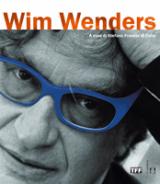 Stefano Francia di Celle [Hg.]: Wim Wenders. Milano: Il Castoro, 2007 Stefano Francia di Celle [Hg.]: Wim Wenders. Milano: Il Castoro, 2007In occasione del 25° Torino Film Festival, un importante volume monografico per la retrospettiva dedicata a Wim Wenders in programma alla manifestazione torinese. Per avvicinarsi alla sempre cangiante e vitalissima opera di uno dei massimi autori del cinema contemporaneo dieci scrittori italiani – Silvia Balestra, Gianni Celati, Marco Lodoli, Domenico Starnone, Laura Pariani, Valeria Parcella, Francesco Piccolo, Claudio Piersanti, Emanuele Trevi e Sandro Veronesi – ricordano il momento in cui un film di Wenders li ha segnati profondamente, provocando irrevocabili scelte cinematografiche ed esistenziali. Da questo cuore di intrecci creativi si dipanano, come cerchi concentrici, riflessioni e spunti rivolti al neofita e all’appassionato spettatore che segue il regista dagli esordi: conversazioni e testi inediti di Wenders, memorie e impressioni dei principali collaboratori, saggi che precorrono i binari classici della critica e dell’analisi, ma anche quelli meno esplorati della filosofia e della psicanalisi. "Posso dire in tutta tranquillità che non sarei quello che sono oggi se attraverso ogni film non avessi capito un po’ meglio il mondo e il mio posto nel mondo. La cosa meravigliosa del fare film non è solo che ti permette di entrare in contatto praticamente con ogni forma d’arte, ma anche che ti concede di condividere le tue esperienze. In effetti si può affrontare un film con l’obiettivo di voler scoprire di più su qualcosa di cui si sa troppo poco, per esempio se stessi." Wim Wenders * Il volume è pubblicato da Il Castoro in collaborazione con il 25° Torino Film Festival. > 288 pagine, ill., brossura |
| home © midas 11/2015 |